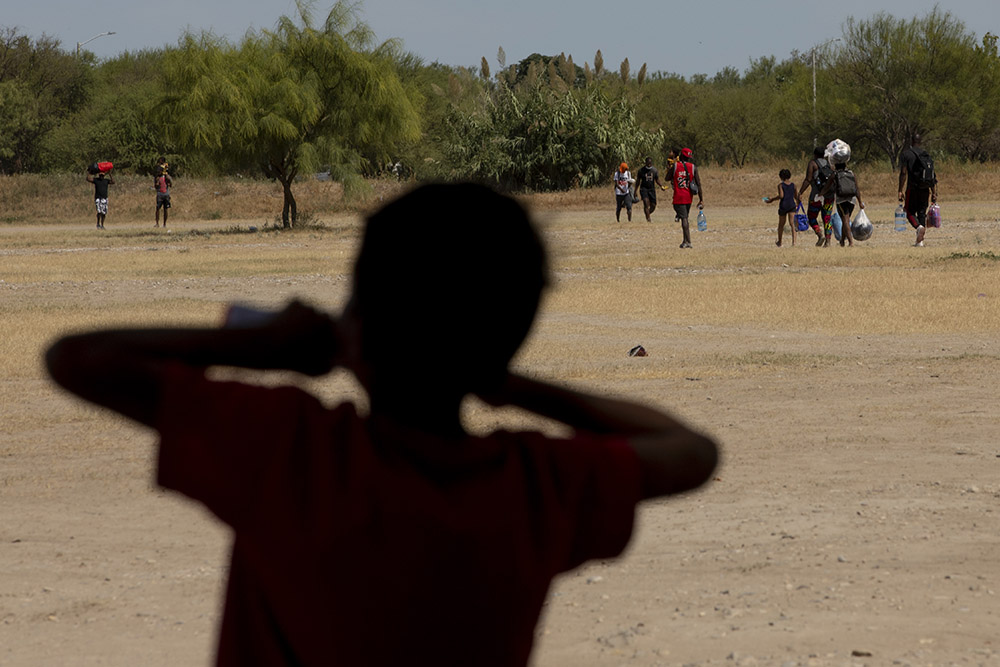
A boy watches other Haitians walk toward the Rio Grande, where many crossed into Del Rio, Texas, from an immigrant camp in Ciudad Acuña, Mexico, Sept. 22. (Nuri Vallbona)
Last month's images of border agents on horseback whipping defenseless Haitian asylum seekers are only the latest horrific example of this country's inhumane mistreatment of fellow human beings seeking a better life for themselves and their families.
The 37 deportation flights returning nearly 4,000 men, women and children to Haiti — where a recent earthquake and additional political instability after the assassination of their president have only compounded the suffering of the poorest country in the hemisphere — ironically came during the church's marking of National Migration Week.
Lord, forgive us.
When the sad history of this current wave of anti-immigrant hysteria is written, Americans will not look much better than during previous iterations of similar nativism, from the Know-Nothings to the Chinese Exclusion Act to "Irish Need Not Apply."
We'll admit: We had hoped for better under our nation's second Catholic president.
To be fair, the new administration has had to deal with a spike in border crossings since Joe Biden took office in January, as many suffering Central Americans and others headed north with hopes for an easier and more humane system under a Democratic president.
Sadly, that has not happened. By July, the number of people taken into custody or expelled at the border hit a 21-year high, with 212,672 people detained. (By comparison, the high during the Trump presidency was 144,000 people in May 2019.)
Also, the Biden administration has not only continued but also defended in the courts the Trump-era law that allows for bypassing normal immigration laws and protections to automatically expel prospective asylees, under the guise of public health because of the coronavirus pandemic.
Advertisement
This law, called Title 42, was the justification used by the administration to deport the Haitians, rather than allow them to pursue asylum. Immigration advocates say Title 42 violates U.S. asylum laws and weaponizes public health.
In addition, despite Biden campaigning to eliminate private prisons for immigration detention, his executive order directing the Department of Justice to end the use of privately operated prisons and jails did not extend to those operated by Immigration and Customs Enforcement.
And it was only after much backlash that the administration finally agreed to raise the refugee cap to 125,000, a campaign promise not initially kept when Biden made a smaller increase to the historically low levels in the Trump era.
Under Biden, the Department of Homeland Security has tried to fight the so-called "Remain in Mexico" policy, in the face of courts' attempts to block the Biden administration from ending the Migrant Protection Protocols program begun under the Trump administration. And the Biden administration has ended the horrific child separation policies and worked to reunite families separated during the Trump years.
Gratefully, most of our church leaders — especially Pope Francis but also the U.S. bishops' conference — have spoken out forcefully for more welcoming immigration policies. The pope has made welcoming the stranger a cornerstone of his papacy; the plight of migrants are emphasized in his encyclical Fratelli Tutti, issued a year ago.
Fear of the other can be an understandable human tendency, one amplified during times of insecurity and change. But our faith calls us to do better.
More recently, a Sept. 22 statement from Washington Auxiliary Bishop Mario Dorsonville, chair of the bishops' Committee on Migration, and Dominican Sr. Donna Markham, president and CEO of Catholic Charities USA, criticized the treatment of the Haitian asylees as "a disregard for human dignity."
"After all, it is in the face of each migrant that we see the face of Christ," Dorsonville and Markham wrote.
But too many U.S. Catholics are not getting the message. Although Catholics are less likely than Protestants to hold unwelcoming views toward immigrants, white Catholics are more likely than Americans as a whole to hold those views, according to a 2020 PRRI poll.
For example, while 57% of Americans opposed building the wall on the U.S.-Mexico border, only 43% of white Catholics opposed the wall. And while 62% of all Americans opposed legislation preventing refugees from entering the country, only 58% of white Catholics did.
A smaller percentage of white Catholics (62%) than Americans overall (66%) supported a pathway to citizenship for immigrants brought illegally to the U.S. as children. And white Catholics were also more likely than Americans overall to see immigrants as an economic and cultural threat, according to the survey, which had a margin of error of +/- 2.6 percentage points given the sample size.
In all of the survey questions, Hispanic Catholics had more welcoming views toward immigrants than white Catholics and Americans overall.
Fear of the other can be an understandable human tendency, one amplified during times of insecurity and change. But our faith calls us to do better, and the message of Jesus couldn't be clearer: Whatsoever you do to the least of my brothers and sisters, you do unto me.
Our collective sins against migrants who have already suffered so much offend not only their human dignity, they are offenses against the Almighty. We should confess those sins and resolve to sin no more.




